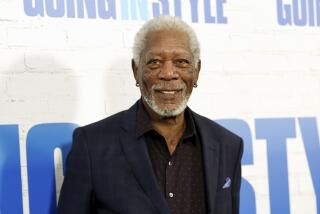The Selling Out of Black History
- Share via
In a Magic Johnson-owned Starbucks I frequent, I glanced at the “specials” chalkboard and noticed someone had rendered a smiling likeness of Martin Luther King Jr. Beneath the image was the line: “Share the Dream ... over a Toffee Nut Latte.” This served to remind me that Black History Month is upon us. And why I have come to despise it.
Don’t get me wrong: Black History Month has value. Those who excavate the history of Africans in this country do vital and necessary work. Without supplementary scholarship, many important accomplishments by people of color would go unknown, and white folk wouldn’t respect blacks at all.
Public school curricula are slow to integrate history lessons because we reserve the shortest month of the calendar to let black people reinvent peanut butter. We order a McMartin burger with Malcolm X-tra cheese, feeling absolved and progressive, thanking God the American Negro is good for something.
When Harvard historian Carter Woodson began the observance of Negro History Week in 1926, it was to offset the misinformation propagated in American history books that barely counted Africans as human, mentioning blacks as slaves and little else.
Since Woodson’s observance became Black History Month in 1976, there has been nothing to incite educators to expand black history into a greater, more inclusive American narrative.
An annual examination of black history can’t be expected to inspire a nation of young black Americans to succeed in a modern United States, which is arguably more prejudiced, more hateful and more subversive than the nation many of our forebears knew.
Spike Lee chastised the filmmakers behind the summer smash “Barbershop” because if our children grow up lampooning important civil rights icons, then “we’re in trouble.” Note to Spike: If our children are getting history lessons at the movie theater, then we’re already in trouble.
Does setting the facts within a humorous context diminish or disrespect the contributions of these people? I think not. I guess if I were Al or Jesse, and these people were among my friends, I might disagree. But they need to see the greater good: When kids see flawed people accomplish great things, or have popular mythology dispelled, they realize that nothing is as hard as it looks.
The black history establishment has invited parody on itself because it takes itself too seriously on some fronts and not seriously enough on others, allowing Nissan and McDonald’s to exploit a few ideals. Black History Month has become the come-on for thousands of commercials and consumer products.
Alcohol and tobacco advertisers use Afrocentric trinkets to push their smack on a media- illiterate, consumer-oriented community quick to buy anything for any reason, certainly anything claiming to refer to some foregone hegemony that most of us couldn’t possibly conceive of, let alone emulate. Even the Centers for Disease Control and Prevention uses the occasion to push an agenda: “Black History Month Tobacco Control.”
I agree that it’s important to honor the great among us. King and Rosa Parks -- and Carl Stokes and Nelson Mandela and on and on -- proved that ordinary people can do extraordinary things. But the Starbucks promotion and the hundreds of others like it are something less than honorable. Black History Month has become a bait-and-switch to create one feel-good moment, in hopes that you will forgive and forget, totally absolved and refreshed -- and nothing changes.
It’s important to honor great accomplishments. These accomplishments are best honored by making them part of the American story, not of an over-commercialized observance. Racism is built on ignorance. Education trumps ignorance.
I don’t propose that Black History Month be dissolved. I suggest that we agitate the mainstream education establishment into making a history book that reflects the history of all Americans. Not just because black history is part of the American story, but because having a complete portrait of the past benefits and informs us all.


